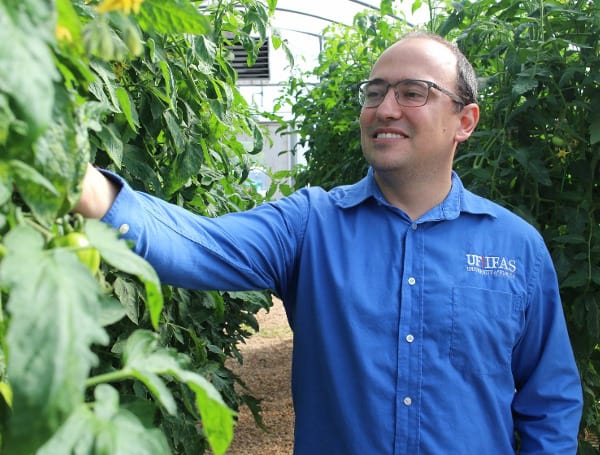Can a computer “taste” a tomato or a blueberry? Well, not exactly, but it can tell scientists which volatiles in these fruits make them taste good, s
Can a computer “taste” a tomato or a blueberry? Well, not exactly, but it can tell scientists which volatiles in these fruits make them taste good, say University of Florida researchers.
UF/IFAS breeder and geneticist Marcio Resende wants to create what he calls an “Artificial Intelligence Connoisseur,” a model that tells researchers which chemical compounds — that is to say, volatiles, sugars, acids and other chemical compounds — produce the best fruit flavors.
“Our study basically shows that these computer models can predict flavor with good accuracy, and in most of the sensory panel attributes,” Resende said.
To find out if a fruit or vegetable is worth breeding, scientists sample the crop for taste and smell themselves, going through fields and picking produce individually.

These processes can present logistical issues, said Harry Klee, a UF/IFAS horticultural sciences professor and a co-author of a new study that looks at how computer models can use volatiles to measure fruit taste.
“Due to cost and logistical limitations, breeders do not typically employ consumer panels in their programs,” Klee said. “The ideal would be to use a large consumer panel that includes a diverse set of potential consumers. We use 100 people, spanning a range of age and ethnicity. This approach is much more representative of the population of shoppers.”
For years, plant breeders and geneticists helped farmers harvest higher yields because consumer-oriented traits such as flavor are harder to measure. However, high yields are not enough for producers to compete in nowadays demanding markets, said Patricio Muñoz, a UF/IFAS horticultural sciences associate professor in charge of the blueberry breeding program.
Producers know that if they do not include varieties that taste good, then their fruit might not sell for a good price or sell at all, said Muñoz. With these methods, scientists hope to help producers stay competitive and consumers have a better experience with their produce.
To address this issue, UF/IFAS researchers screened a group of 70 chemical compounds, including sugars, acids and volatiles of diverse tomato and blueberry types and their corresponding panel ratings to create statistical and machine-learning models that can predict sensory perceptions of fruit flavor.
Using these models, a breeding program can assess flavor ratings for many fruit and vegetable varieties. This process was previously limited by the fact that neither scientists nor consumer panels can test very many varieties at once.
Resende led the new research that shows ways to get data from volatiles in blueberries and tomatoes into a statistical model. The research findings are now limited to those two fruits but will later be expanded to other crops UF/IFAS researchers develop.
To conduct their new study, UF/IFAS researchers used tomato and blueberry breeding program data from the past decade.
They gave a diverse set of tomato and blueberry varieties to consumer panels at the UF Sensory Lab in Gainesville. The scientists then collected ratings on flavor attributes such as “liking,” sweetness, sourness, flavor intensity and umami.
UF/IFAS researchers tested the range of scores that tell them how much a consumer likes a flavor. As it turns out, volatiles explained up to 56% of the “like” scores, which reinforces evidence that volatiles are important in determining how much consumers like the fruit. Volatiles are also important in quantifying and estimating the importance of fruit flavor, Resende said.
Furthermore, researchers showed that machine-learning approaches are generally the best predictors of consumer flavor preferences, called metabolomic selection. Accuracies of metabolic selection are superior to models that use genomic data instead, highlighting the potential of this new method in breeding applications.
“I think the main point is that breeders can screen a larger number of samples,” said Resende, a UF/IFAS assistant professor of horticultural sciences. “This way, you have a wider funnel to identify the good-tasting varieties, and at one point, taste-testing panels make a final selection with the sensory data. We expect that these models will enable an earlier incorporation of flavor as a breeding target and encourage selection and release of more flavorful fruit varieties.”
“While breeders usually are intimately familiar with their crop, their flavor preferences may provide a limited snapshot of consumer responses,” Klee said. “What we have done is assemble a massive database of consumer evaluations of well over 100 different tomato and blueberry varieties. With broadly accessible technology, breeding programs can assess a wide range of their materials, leverage our extensive data set and focus efforts on the best.”
In addition to Resende, included among the other UF/IFAS faculty who investigated the computer model method of taste-testing were Klee, Muñoz and Denise Tieman, a research assistant professor — all three in the horticultural sciences department; Charlie Sims, a professor in food science and human nutrition and Nikolay Bliznyuk, an associate professor in agricultural and biological engineering. The work is also first-authored by Ph.D. student Vincent Colantonio and Research Assistant Scientist Luís Felipe Ferrão.
Visit Tampafp.com for Politics, Tampa Area Local News, Sports, and National Headlines. Support journalism by clicking here to our GoFundMe or sign up for our free newsletter by clicking here.
Android Users, Click Here To Download The Free Press App And Never Miss A Story. Follow Us On Facebook Here Or Twitter Here.

COMMENTS